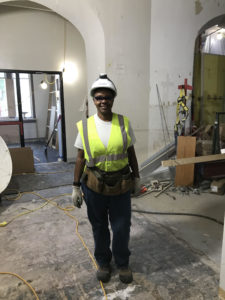Woman Makes Journey to America to Become Electrician and Challenge Expectations
Learning a new trade is no walk in the park. And Helen Spindler knows that better than anybody.
After leaving Tanzania for America, she took her career in a completely different direction. And, while taking care of her family and building a future in construction, Helen is challenging traditional expectations for women and breaking down barriers.
Growing up in Tanzania, Helen worked as an administrative assistant for 20 years, from when she was 22 years old until she went back to school in 2005. After earning her bachelor’s degree in public administration from the Open University of Tanzania, Helen moved to the United States.
Settling down in Shoreview, Minnesota, Helen began working at a daycare center, but quickly found herself wanting more hands-on, engaging work.
“I didn’t want to sit behind a desk as an assistant anymore, and I couldn’t sit around talking to babies all day,” Helen says. “I needed a challenge.”
Helen met her husband, Timm, in Minnesota. She met her husband when she was working at the daycare. Timm is a union painter, and he encouraged Helen to go into painting as well. But, again, she decided that she wanted something more challenging – a trade that would engage her mind. Because at her core, Helen is a problem solver.
“There are many electricians on my husband’s side of the family,” Helen explains. “They encouraged me to take the electrician route, so that’s what I decided to try.”

Helen has been working for the Peoples Electric Company, located in St. Paul, Minnesota, for the past two years, where she has learned basic skills and built a foundation for a career in electrical work.
Not long after Helen began working for Peoples Electric, the company connected her with Building Minnesota, an apprenticeship program that introduces women, veterans and people of color to careers in construction.
The Building Minnesota Apprenticeship program is an entry-level training program that gives individuals the chance to explore careers in the construction industry and learn a trade from organized construction unions and private companies.
Seventy percent of those workers who enter the program become fully qualified union apprentices and go on to have successful careers in the union building trades.
Building Minnesota helped Helen apply for an apprenticeship with the International Brotherhood of Electrical Workers Local 110 Union. She was accepted as a pre-apprentice 2016, and recently was accepted as a full-time apprentice. She’s looking forward to becoming a journeyman and eventually a master electrician.
“It’s a five-year program,” Helen says. “I will start working and taking classes as an apprentice in the fall of 2018.”
“I will learn about electrical installation in class, and then I will learn how to do it in the field,” she adds. “We also rotate job sites every few weeks so we can get experience in residential buildings, commercial buildings and outdoor electrical installations such as lighting systems and traffic lights.”
Helen is incredibly proud to be working in a skilled trade, as expectations for women are very different in Tanzania, where she was born, then here in the United States.
“In my culture, men don’t think that women can become electricians,” Helen says. “A lot of people think that a woman’s place is at home, taking care of her children.”
“My aunt and my friends couldn’t believe it when I told them I was becoming an electrician,” she explains. “I told them that it was easy. It doesn’t matter whether you are a man or a woman. Everyone can do it.”
“I want to show my children that women can do everything men can do,” Helen adds. “I want to be a good role model for them.”
Helen hopes to continue challenging expectations for women around the world and to teach other trade workers as a full-fledged journeyman.
“I love my work, and I can’t wait to learn more,” Helen says. “I want to do a good job as an apprentice and journeyman, and teach others everything I know.”
“My job gives me a sense of opportunity, and I earn a much higher income than I did at the daycare,” she explains. “My family is in a great place right now.”

Because of her higher wages and benefits as an electrician-in-training, Helen and her family are able to live more comfortably and take advantage of more opportunities.
“We don’t depend on one person for our household income anymore,” Helen says. “My wages give us the extra income to buy a home and build a nest egg for retirement.”
“I don’t have a single regret about becoming an electrician,” she adds. “I believe in myself and I am going to succeed for my family.”
Helen has a few words of wisdom for others hoping to become electricians, particularly for black women and immigrants like her.
“We are all equal, and we can all do this work,” Helen says. “Some people don’t think that women can do the same work as men, so we need to break away from that mindset.”
“Whatever men can do, women can do,” she explains. “So, figure out how to get started. You can talk to someone at a company for guidance, or get involved with the Building Minnesota program.”
“If you are willing to try something new and believe in yourself, you can do anything,” she says.
